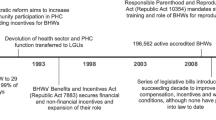Abstract
Despite a significant increase in the size of the Asian American elderly population, little is known about their social service needs and the level of service being provided them. This study used a survey methodology to examine all Asian American senior programs (N = 20) in a major American metropolitan region. The response rate was 90% with respondent agencies serving as the unit of analysis. Findings suggest that Asian elderly clients were primarily women and 'old-old', and that many of them were on SSI. Services provided were primarily tangible and facilitative, rather than clinical. Services needed but not provided were emergency psychiatric care, home attendants, home-delivered meals, legal services, medical services, and protective services. Findings of this study provide useful information for further research and program planning for Asian American elders in urban settings.
Similar content being viewed by others
References
Aponte, J. (1983). Need assessment: The state of the art. In R. Bell, M. Sundel, J. Aponte, S. Murrell & E. Lin (eds.), Assessing health and human services needs: Concepts, methods and applications. New York: Human Services Press.
Balgopal, P. (1995). Asian Americans overview. In R. Edwards (Editor-in-Chief), Encyclopedia of social work, 19th edition. Washington, DC: NASW Press.
Browne, C. & Broderick, A. (1994). Asian and Pacific Island elders: Issues for social work practice and education, Social Work39(3): 252–259.
Burr, J. & Mutchler, J. (1993). Nativity, acculturation, and economic status: Explanations of Asian American living arrangements in later life, Journal of Gerontology48(2): S55–S63.
Chapelski, E. (1989). Determinants of knowledge of services to the elderly: Are strong ties enabling or inhibiting? The Gerontologist29(4): 539–545.
Department for the Aging (1990). Borough and community district profiles of older New Yorkers. City of New York, Department for the Aging.
Dhooper, S. (1991). Toward an effective response to the needs of Asian-Americans, Journal of Multicultural Social Work1(2): 65–81.
Fong, R. & Mokuau, N. (1994). Not simply 'Asian Americans': Periodical literature review on Asians and Pacific Islanders, Social Work39(3): 298–305.
Gibson, R. C. (1989). Minority aging research: Opportunity and challenge, Journal of Gerontology: Social Sciences44: S2–S3.
Jackson, J. S. (1989). Race, ethnicity, and psychological theory and research, Journal of Gerontology: Psychological Sciences44: P1–P2.
Kahn, A. (1979). Social policy and social services, 2nd edition. New York: Random House.
Kettner, P., Moroney, R. & Martin L. (1990). Designing and managing programs: An effectiveness-based approach. Newbury Park, CA: Sage Publications.
Lam, A. & Kavanaugh, D. (1996). Help seeking by immigrant Indochinese psychiatric patients in Syndey, Australia, Psychiatric Services47(9): 993–995.
Lauffer, A. (1982). Getting the resources you need. Newbury Park, CA: Sage Publications.
Lee, J. (1991). Development, delivery, and utilization of services under the older Americans act: A perspective of Asian American elderly. New York: Garland Publishing.
McKillip, J. (1987). Need analysis: Tools for the human services and education. Newbury Park, CA: Sage Publications.
Mui, A. (1996). Depression among elderly Chinese immigrants: An exploratory study, Social Work41(6): 633–646.
Nguyen, T., Attkisson, C. & Bottino, M. (1983). The definition and identification of human service needs in a community. In R. Bell, M. Sundel, J. Aponte, S. Murrell & E. Lin (eds.), Assessing health and human services needs: Concepts, methods and applications. New York: Human Services Press.
Royse, D. & Drude, K. (1982). Mental health needs assessment: Beware of false promises, Community Mental Health Journal18(2): 97–106.
Sallis, J. & Henggeler, S. (1980). Needs assessment: A critical review, Administration in Mental Health7(3): 200–209.
United Way of America (1982). Needs assessment: The state of the art. Alexandria, VA: United Way of America.
U.S. Bureau of the Census (1991). Census Bureau Press Release CB91-215, September 1991.
Wallace, S. (1990). The no-care zone: Availability, accessibility, and acceptability in community-based long term care, The Gerontologist30(2): 254–261.
Yeatts, D., Crow, T. & Folts, E. (1992). Service use among low-income minority elderly: Strategies for overcoming barriers, The Gerontologist32(1): 24–32.
Yu, L. & Wu, S. (1985). Unemployment and family dynamics in meeting the needs of Chinese elderly in the United States, The Gerontologist25(5): 472–476.
Author information
Authors and Affiliations
Rights and permissions
About this article
Cite this article
Mui, A.C., Domanski, M.D. A community needs assessment among Asian American elders. Journal of Cross-Cultural Gerontology 14, 77–90 (1999). https://doi.org/10.1023/A:1006652809763
Issue Date:
DOI: https://doi.org/10.1023/A:1006652809763




